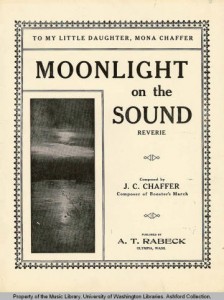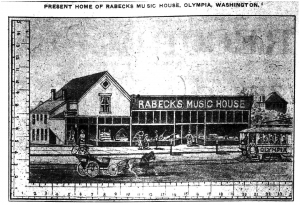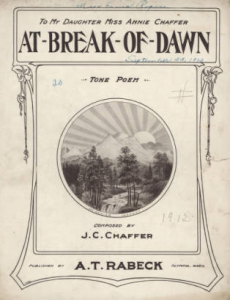By Drew Crooks
Music has always been part of Olympia’s life. Many talented people have participated in the city’s musical activities. One such individual was James Crossley Chaffer. Though Chaffer (and his wife Bertha) only lived in Olympia from about 1907 to 1912, he can be considered a “music man” who impacted the community as teacher, composer, and theater manager.

James Chaffer was a music teacher. Notices in the local newspapers declared in 1907 that he was the director of the Olympia Pianoforte School. One advertisement, printed in the October 21, 1907 issue of the Morning Olympian, stated that “Prof. J. C. Chaffer” gave “lessons on Piano, Organ, Harmony, Counterpoint, Musical History, etc.” Terms were $4.00 per month for one lesson per week or $7.00 a month for two lessons a week.
Chaffer also achieved some fame as a composer. The Morning Olympian on October 2, 1907 quoted the following from the Pacific Music Journal:
“Among the western composers– and one of the most successful of popular music writers, is J.C. Chaffer, of Olympia. During the fall four songs were published by the composer, three being put on the market at the same time, all of which enjoyed a success that would warrant a feeling of satisfaction to a composer of longer experience.
“Mr. Chaffer has cleverly taken advantage of the spirit of Tacoma and Seattle in three of his popular song hits, ‘Watch Tacoma Grow,’ ‘The Boosters,’ and ‘Seattle, Dear Seattle.’ The sentiment expressed coupled with the pleasing melodies, has readily won a place on the list of the past year’s successes. Being, perhaps, the most prolific writer on the coast, it is a mark of genius that the varied styles are peculiar to the composer. Everything thus far produced is entirely original, showing that when further developed the imagination of this composer will bring forth music that will go down with time as standard.
“Mr. Chaffer’s latest instrumental number “Moonlight on the Sound” (reverie) is now being published by Victor Kremer & Co., of New York and London and is pronounced by musical critics to be one of the prettiest numbers published in recent years. Another number which is destined to become a favorite especially with the Washington girls is Prof. Chaffer’s latest march song entitled ‘A Washington Girl for Mine.’”

The Olympia composer wrote a number of songs. Some of these he dedicated to members of his family. “Moonlight on the Sound,” for example, was inscribed to his daughter Mona in 1906, while “At Break of Dawn” was dedicated to another daughter Annie in 1912.
A number of compositions by Chaffer were published as sheet music by A. T. Rabeck. In the early 20th century, this Olympia businessman operated the Rabeck Music Store at 411 East Fourth Street (now Avenue). Interestingly, Jim and Catherine Yenney in 1946 bought the Music Store from the Rabeck family and renamed it Yenney Music. Today Yenney Music continues in operation with its store located in Olympia on Capital Mall Drive.
Surviving sheet music of J. C. Chaffer’s songs can currently be found in historical collections scattered across the Pacific Northwest, including those at the libraries of Gonzaga University, University of Oregon, University of Washington, Washington State Historical Society, and Washington State University. This sheet music provides windows through which we can see a different era, perhaps a more innocent one.
Besides being a teacher and a composer, Chafer was also a theater manager in an age when music played a critical role in most public entertainment. He was the proprietor of the Lyric Theater, which stood at 121 East Fourth Street. According to historian Steve Willis, this would be “across the street and a bit east from the present day Spar.” The Lyric provided a mixture of entertainment: movies, vaudeville, and musical concerts.

Besides the Lyric, James Chaffer also managed for a time the Olympia Theater (sometimes referred to as the Olympia Opera House). This entertainment institution stood for many years at 511 East Fourth Street, now the site of Orca Books. In 1910 the Olympia Theater, as noted in the Olympia Daily Recorder newspaper issue of January 11, hosted an imaginative production which featured many of Chaffer’s songs:
“The Woman’s Club of Olympia will present the new and original musical comedy, Herr Spiegelmeister, at Olympia theater tonight. This production is written by an Olympia author and the musical numbers are by Mr. J. C. Chaffer, manager of the Lyric and Olympia theaters, and are said to be every one a hit. The overture has been composed by W. W. Zinner, the popular violinist at the Lyric theater, and possess exceptional merit. The musical number[s] are as follows (all composed by J. C. Chaffer except the overture):
“Overture. Songs: “Yankle Doodle Queen.” “Little Girl.” “A Washington Girl for Mine.” “There Is No Time to Worry.” “A Week End Trip to Europe.” “Vacation Days.” “A Dutchman’s Bill of Fare.” “Money Wooes.”
“The story is woven around the daughter of a millionaire who at his death bequeathes to her his entire fortune on conditions that she marries his favorite poet, Herr Spiegelmeister. He has never met the poet and does not know that this name is a nom de plume. The scenes are laid at Newport [Rhode Island] and fortune hunters are soon informed of the terms of the millionaire’s will and the daughter is sought after by an army of Herr Spieglmeisters. Some very funny situations are therefore enacted and the whole play of three acts is a scream from start to finish. Seats are now on sale at Anders’ Pharmacy.”
In early 1912 James Chaffer sold the Lyric Theater to Christian Donges. He and his family left Olympia on February 13 to care for his ill mother in England. Later the Chaffer family ended up in Vancouver, British Columbia. James died on February 7, 1939 at the age of 64, while his wife Bertha passed away on December 5, 1944 at 70. They are buried with a shared headstone at Vancouver’s Mountain View Cemetery.
Through his work as a music teacher, composer, and theater manager, James Chaffer helped shape life in early 20th century Olympia. This man must have brought musical joy to many people. Surely it is worthwhile to remember some of the creative people in Olympia’s history like Chaffer, who were positive forces in the community during their lifetimes.
Acknowledgments: My thanks go to the staff of the Washington State Library. Without their helpful assistance this article could not have been written. Also I would like to acknowledge Steve Willis’s 2011 article on OlyBlog.net, “J. C. Chaffer, Olympia’s Forgotten Composer.” This blog entry provided some important insights on Chaffer and his music.


















































